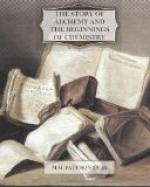“Surely every true Artist must look on this elaborate tissue of baseless operations as the merest folly, and can only wonder that the eyes of those silly dupes are not at last opened, that they may see something besides such absurd sophisms, and read something besides those stupid and deceitful books.... I can speak from bitter experience, for I, too, toiled for many years ... and endeavoured to reach the coveted goal by sublimation, distillation, calcination, circulation, and so forth, and to fashion the Stone out of substances such as urine, salt, atrament, alum, etc. I have tried hard to evolve it out of hairs, wine, eggs, bones, and all manner of herbs; out of arsenic, mercury, and sulphur, and all the minerals and metals.... I have spent nights and days in dissolving, coagulating, amalgamating, and precipitating. Yet from all these things I derived neither profit nor joy.”
Another writer speaks of many would-be alchemists as “floundering about in a sea of specious book-learning.”
If alchemists could speak of their own processes and materials as those authors spoke whom I have quoted, we must expect that the alchemical language would appear mere jargon to the uninitiated. In Ben Jonson’s play The Alchemist, Surley, who is the sceptic of the piece, says to Subtle, who is the alchemist—
... Alchemy is a pretty kind of game, Somewhat like tricks o’ the cards, to cheat a man With charming ... What else are all your terms, Whereon no one of your writers ’grees with other? Of your elixir, your lac virginis, Your stone, your med’cine, and your chrysosperme, Your sal, your sulphur, and your mercury, Your oil of height, your tree of life, your blood, Your marchesite, your tutie, your magnesia, Your toad, your crow, your dragon, and your panther; Your sun, your moon, your firmament, your adrop, Your lato, azoch, zernich, chibrit, heutarit, And then your red man, and your white woman, With all your broths, your menstrues, and materials, Of lye and egg-shells, women’s terms, man’s blood, Hair o’ the head, burnt clout, chalk, merds, and clay, Powder of bones, scalings of iron, glass, And moulds of other strange ingredients, Would burst a man to name?
To which Subtle answers,
And
all these named
Intending but
one thing; which art our writers
Used to obscure
their art.
Was not all the
knowledge
Of the Egyptians
writ in mystic symbols?
Speak not the
Scriptures oft in parables?
Are not the choicest
fables of the poets,
That were the
fountains and first springs of wisdom,
Wrapp’d
in perplexed allegories?




